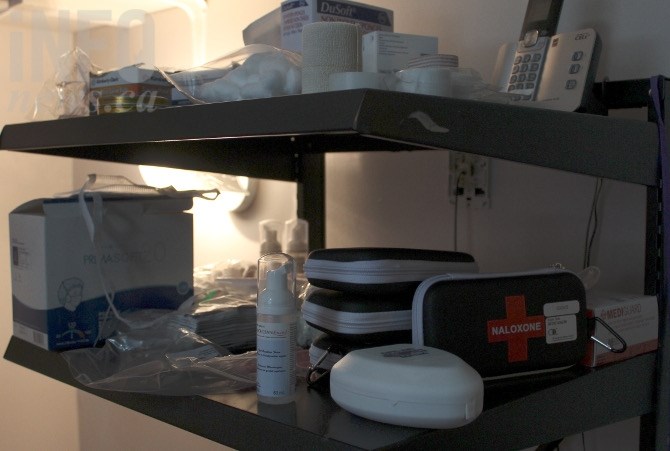
Some of the gear ASK Wellness has received as part of the overdose prevention services now in operation at Crossroads Inn in downtown Kamloops.
(BRENDAN KERGIN / iNFOnews.ca)
December 23, 2016 - 2:30 PM
KAMLOOPS - After being open for less than a week, the new overdose prevention sites in Kamloops have already helped save lives.
ASK Wellness executive director Bob Hughes says his organiztion only had three and half days to get the first site going after the Interior Health Authority announced on Tuesday, Dec. 13 the sites would be open by the end of the week, but already staff have resuscitated two people at the Crossroads Inn since Friday, Dec. 16.
“The first one happened during the overdose prevention services time,” he says.
The second one happened at 4 a.m. Thursday morning, Dec. 22. Staff, who are onsite 24 hours a day, were notified by other residents that someone upstairs was overdosing.
"Our staff was able to grab the naloxone kit, take the mobile phone, call 911, do all of the procedures our staff have, administer the naloxone and keep that person stable and contained until the paramedics came,” Hughes says. The person was able to leave the hospital by 7 a.m.
The two new sites are more a formalization of what ASK Wellness has already been doing.
Hughes says ASK Wellness staff have resucitated more than 40 people so far this year. The introduction of the overdose prevention program relieves stress from staff who were hired for different tasks and projects, not helping people who are overdosing. The program has added to the organization's staff and increased resources at the two overdose prevent sites at the Crossroads Inn in downtown and the outreach centre on the North Shore.
A nurses station has been set up at the Crossroads Inn as part of the overdose prevention service program. A former street nurse is working out of the office from 12 p.m. to 7:30 p.m. The room is fairly basic, with a shelf of basic medical supplies and naloxone, and space for the nurse to work.
“Interior Health was fantastic in getting us the gear here,” he says. “We have a nurse that stepped in... She came in here guns a-blazing.”
The new help will help Hughes and his staff deal with the crisis which they’ve been on the front line of since it began.
“We’ve never had a nurse that has been embedded in our housing and our offices,” he says. “This isn’t just about overdose prevention, this is about providing the required health care to this population.”
However, the set up is temporary.
“This is just a means to an end,” he says. “We have a three month agreement with the health authority to the end of March. My hope is by that time, by April 1, we have a robust induction process for these folks to get into some alternative ways of living.”
At this point, Hughes says the province is hopefully at the worst point of the crisis, as actions like the overdose prevention services start. Additionally, naloxone kits containing the potentially life saving drug are becoming more common in the community and he’s hearing of opiate abusers saving each other.
“Whatever we do now can’t be worse then where we’re at,” he says. “I’m going to suggest we’re at the bottom here.”
To contact a reporter for this story, email Howard Alexander or call 250-491-0331 or email the editor. You can also submit photos, videos or news tips to the newsroom and be entered to win a monthly prize draw.
We welcome your comments and opinions on our stories but play nice. We won't censor or delete comments unless they contain off-topic statements or links, unnecessary vulgarity, false facts, spam or obviously fake profiles. If you have any concerns about what you see in comments, email the editor in the link above.
News from © iNFOnews, 2016